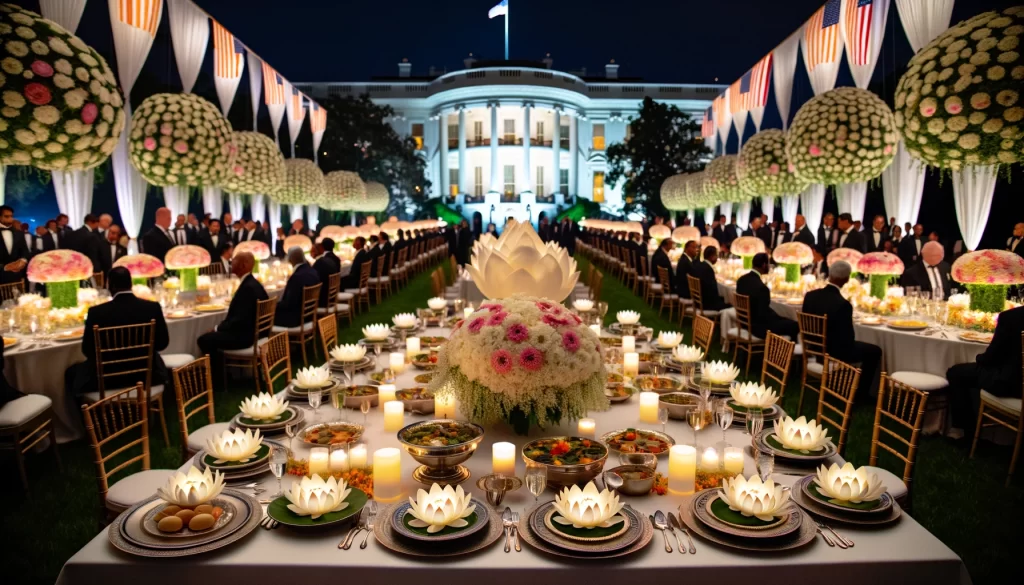Last year, the White House made significant efforts to welcome Indian Prime Minister Narendra Modi during his state visit. This visit aimed to strengthen the relationship with India, a country seen as a rising power and a possible ally against China.
The event featured meticulous decorations with lotus blooms on the tables at the South Lawn, a symbol associated with Modi’s political party, the Bharatiya Janata Party. A special chef was even brought in from California to oversee a vegetarian menu for the occasion. During the visit, President Biden highlighted the foundation of the U.S.-India relationship, praising it as one “built on mutual trust, candor, and respect.”
However, even as Prime Minister Modi enjoyed the celebrations on June 22, a serious plot was unfolding behind the scenes. An officer from India’s intelligence agency, known as the Research and Analysis Wing or RAW, was directing a hired team in the United States to carry out an assassination. The target was Gurpatwant Singh Pannun, a Sikh activist and a vocal critic of Modi, living in New York. According to U.S. and Indian security officials, the officer, Vikram Yadav, had sent out instructions confirming the assassination was a high priority and should proceed once Pannun was confirmed to be at his home.
This plot, which was eventually stopped by U.S. authorities, is said to have been orchestrated from within RAW itself, with some of its higher-ranking officials also under suspicion. Investigations involving multiple agencies, including the CIA and FBI, suggest that these actions might connect back to Modi’s closest advisors.
U.S. intelligence reports, which have been kept confidential, indicate that the head of RAW at the time, Samant Goel, approved the operation. This aligns with information from former Indian security officials familiar with the case, who claimed Goel was under significant pressure to eliminate what was perceived as the threat of Sikh extremism abroad. The involvement of Modi’s national security adviser, Ajit Doval, is suspected but not confirmed, as definitive evidence has not yet surfaced.
The idea of India conducting lethal operations on North American soil has been surprising to Western security officials. Yet, it is part of a broader shift as India asserts itself more forcefully on the global stage, responding to global competition and its own nationalistic impulses.
The attempt to assassinate Pannun is part of a broader pattern of increasing aggression by RAW towards the Indian diaspora, not just in North America but also in Asia and Europe. This includes the murder of another Sikh activist in Canada, and a series of violent incidents in Pakistan targeting separatists.
These actions have led to increased scrutiny of Modi’s government, which has seen economic growth and a rising international profile but also accusations of deepening authoritarian tendencies. A recent report by Freedom House labeled India as engaging in “transnational repression,” employing intimidation and violence against its citizens abroad—a practice also associated with several other authoritarian regimes globally.
The Indian government has not provided detailed responses to these allegations, maintaining that targeted killings are not part of its policy.
For the past three years, the Biden administration has been working to strengthen its relationship with India. However, recent assassination plots have created a dilemma, challenging the U.S. to balance its expressed values against strategic interests.
In response, high-level meetings at the White House began last July to determine how to address these issues without causing major disruptions in U.S.-India relations. Key figures such as CIA Director William J. Burns were tasked with confronting Indian officials to demand accountability. Despite these efforts, the U.S. has not yet imposed any sanctions, expulsions, or other significant penalties.
The U.S. legal approach also shows a degree of caution. Although senior Justice Department and FBI officials were in favor of prosecuting Vikram Yadav, an officer from India’s intelligence service, for his role in the assassination plots, he was only named as an unnamed co-conspirator in the charges, and the indictment did not explicitly link him to the Indian intelligence agency.

Justice Department representatives involved in White House discussions argued against pressing criminal charges against Yadav. The National Security Council’s spokesperson, Adrienne Watson, emphasized that the Biden administration respects the independence of legal processes, stating, “Charging decisions are the prerogative of law enforcement alone.”
The only charges made public so far involve Nikhil Gupta, described in the indictment as a middleman involved in drug and weapon trafficking, who was tasked with hiring a contract killer. Gupta, who is contesting the charges, was arrested in Prague and is currently awaiting a court decision on the U.S. extradition request.
The White House has continued efforts to manage the situation quietly, including warning the Modi government about an upcoming investigative report by The Washington Post.
RAW, traditionally focused on regional issues, particularly with Pakistan, has under Modi’s leadership expanded its activities to target dissidents globally. This shift includes using criminal networks for operations that India wants to keep untraceable to its government. This strategy, however, has revealed serious misjudgments and deficiencies in operational skill, particularly in the failed plot against Pannun.
Yadav, who was responsible for coordinating the assassination attempt, was criticized for his lack of experience and skills necessary for such a complex operation, particularly against the robust U.S. counterintelligence. He had joined RAW mid-career from India’s less prestigious Central Reserve Police Force, which some believe contributed to these lapses. After the plot failed, he was reportedly transferred back to a less prestigious position.
The U.S. affidavit details the communication between Yadav and Gupta, who used encrypted messages to plan the assassination. Gupta sought to hire an assassin through contacts in the criminal underworld, unaware that one of these contacts was actually an informant for the U.S. Drug Enforcement Administration.
The situation escalated when Gupta asked about hiring someone to kill a lawyer in New York. This led U.S. agents to monitor Gupta more closely, eventually setting up a sting operation with an undercover agent posing as a hitman. This operation captured evidence of a financial transaction intended as a down payment for the assassination.
At one point, U.S. agents even obtained footage of Nikhil Gupta during a video call. Gupta turned his camera towards three men dressed formally, sitting around a conference table, likely Indian operatives directing the mission. During this call, Gupta assured the supposed assassin, “We are all counting on you.”
Vikram Yadav, another key figure, hinted at future assignments beyond the planned hit on Gurpatwant Singh Pannun, mentioning a “big target” in Canada. However, before this plan could be executed, another team carried out the assassination, suggesting RAW’s involvement with various criminal groups.
The urgency of these plots was underscored when, shortly after the murder of Sikh activist Hardeep Singh Nijjar in Canada, Yadav sent Gupta a disturbing video showing Nijjar’s lifeless body in his car. This occurred as U.S. officials were orchestrating a plan to capture Gupta by luring him out of India to a location where they could arrest him more easily.
Gupta traveled to the Czech Republic under the impression he was attending a covert meeting. Unbeknownst to him, Czech authorities had already issued a secret arrest warrant at the request of U.S. officials. According to court filings submitted by Gupta’s family in India, upon his arrival in Prague, local police, along with U.S. agents, quickly detained him in a car. During his detention, authorities seized his belongings and interrogated him as they drove around Prague. Gupta was eventually placed in a local prison, awaiting potential extradition.

In the aftermath, Gupta’s family sought assistance from Yadav but discovered he had vanished, severing all previous constant communication.
The involvement in these operations reached high levels within the Indian government. Current and former officials indicate that senior officials linked to Prime Minister Modi’s inner circle, including RAW chief Samant Goel and national security adviser Ajit Doval, were likely aware or involved, although direct evidence of their participation remains elusive.
Both Goel and Doval are veterans of India’s security forces, with careers shaped by internal conflicts similar to how U.S. security professionals were influenced by the events of September 11, 2001. Doval, known for his daring undercover missions, has also been associated with interactions with the criminal underworld, including a notable incident where he was detained while allegedly attempting to organize a hit through gangland contacts.
Before becoming the national security adviser, Doval advocated for a more aggressive stance against perceived threats to India from abroad, a philosophy that Goel, who had a reputation for harsh security measures, shared.
U.S. intelligence agencies believe that given the hierarchical nature of Indian government operations and Doval’s known aggressive security policies, it is probable that he was aware of or sanctioned RAW’s assassination operations, which targeted individuals the Indian government considered threats.
India’s adoption of a “defensive offense” strategy has led to numerous confrontations with Western security services, reflecting a more aggressive posture in international operations.
In Australia, the situation escalated in 2020 when two officers from RAW were expelled. This action followed the disruption of a spy network by Australian intelligence, described by Mike Burgess, the head of Australia’s intelligence service, as a “nest of spies” involved in activities like monitoring the Indian diaspora, attempting to infiltrate local police, and stealing airport security data. While Burgess did not specify the agency in his 2021 speech, Australian officials later confirmed to The Washington Post that it was indeed RAW.
Similar issues have arisen in Germany, where federal police have arrested several individuals within the Sikh community for secretly working for RAW. This included a couple who, under the guise of running a website about local Sikh events, were actually being paid by RAW.
In Britain, the aggressive surveillance and harassment of Sikhs by RAW, particularly around Birmingham, became so problematic in 2014 and 2015 that MI5, Britain’s domestic security service, had to intervene. They issued warnings to Samant Goel, then RAW’s station chief in London. Goel dismissed these concerns and accused British officials of being too lenient towards Sikh activists, whom he labeled as terrorists. Following continued disagreements, British officials considered expelling him, but Goel returned to India and eventually rose to the top position in RAW.
The agency’s activities have also raised suspicions regarding the death of Sikh activist Avtar Singh Khanda in Birmingham, although British officials attributed his death to natural causes. His family and supporters, however, have called for further investigation.
A recent U.S. State Department human rights report highlighted India’s alleged involvement in transnational repression, citing incidents of extraterritorial violence, harassment, and coercion against dissidents and journalists abroad.

RAW’s focus during Modi’s tenure has largely been on the Sikh community, particularly on a faction advocating for the creation of Khalistan, a separate Sikh state from India. This movement, which peaked in the 1980s with significant violence and upheaval, including the infamous 1984 assault on the Golden Temple and the assassination of Prime Minister Indira Gandhi by her Sikh bodyguards, led to a severe crackdown and mass migration of Sikhs.
In recent years, activists like Pannun and Nijjar have attempted to revive the Khalistan movement through referendums and protests, occasionally inciting controversy, such as a parade in Canada that featured a float depicting Gandhi’s assassination. Despite these efforts, the movement has not seen significant support beyond a small segment of the diaspora.
The Indian government, under Modi and his Bharatiya Janata Party, has portrayed these activities as a significant threat, which critics like Ajai Sahni, a New Delhi-based expert on the Punjab insurgency, argue is exaggerated for political purposes. This portrayal helps the government position itself as a protector of the majority Hindu population.
Both Pannun and Nijjar were labeled as terrorists by the Indian government in 2020, under a controversial law criticized for bypassing due process. Pannun, in an interview, denied any involvement in terrorism and suggested that the assassination attempts against him were aimed at stifling the Khalistan referendum movement.
Modi’s comments on the assassination plots have been minimal and non-committal. “Our commitment is to the rule of law,” he emphasized in a Financial Times interview.
U.S. and Western security experts believe that RAW’s operations likely had the approval of Prime Minister Narendra Modi.
Since his election in 2014, Modi has cultivated a persona of a Hindu nationalist leader, often displaying his strength through symbolic actions like riding in tanks and flying fighter jets. He has also been vocal about his direct orders for military actions, such as the 2019 airstrike against Pakistan.
Pro-Modi media has played a significant role in reinforcing this image, especially last year when 11 individuals accused of militancy were killed in Pakistan. These events were portrayed as victories over Khalistani militants, enhancing Modi’s strongman image.
Internally, the alleged assassination plots orchestrated by RAW were not fully understood by U.S. and Canadian officials until they were nearly executed. In Canada, the killing of Nijjar was initially seen as a local criminal feud. In the U.S., the plot against Pannun was treated as a standard DEA investigation until the arrest of Gupta, which unveiled deeper connections to India’s intelligence service.
This revelation led to urgent meetings at the White House, where officials deliberated on how to address this breach of sovereignty without disrupting the strategic partnership with India, particularly in the context of global competition with China.
In August, CIA Director William Burns was sent to New Delhi to present the findings to Indian officials and to encourage an internal resolution. The U.S. chose a cautious approach, refraining from harsh penalties like expulsions or economic sanctions, hoping India would hold responsible parties accountable. This included continuing with a significant arms deal with India.

This leniency has drawn criticism, especially when compared to U.S. actions against Russian and Iranian operatives for similar offenses. The Justice Department has remained silent on this matter, citing it as ongoing.
The U.S. approach mirrors its handling of Saudi Arabia after the involvement of Crown Prince Mohammed bin Salman in the assassination of Jamal Khashoggi, suggesting a pattern of prioritizing strategic relationships over punitive actions.
Canada, however, took a more assertive stance. Prime Minister Justin Trudeau publicly accused India of involvement in Nijjar’s murder and expelled RAW’s station chief in Ottawa, leading to a diplomatic strain. Canadian intelligence intercepted messages they believed were attempts by India to sow confusion, a tactic seen as disinformation.
The tension between Canada and India eased over time as Indian officials, confronted with evidence from the U.S., found their position increasingly difficult to defend.
The potential scope of India’s assassination plans appears to extend beyond the already known cases, suggesting a wider strategy of targeting dissidents in the United States and Canada.
According to legal documents, Yadav informed Gupta that RAW had a list of “three or four” additional targets they intended to eliminate after Nijjar and Pannun. Gupta further revealed to an undercover U.S. agent, whom he believed to be a hitman, that there were “so many targets.” This alarming revelation comes as at least ten Sikh activists across North America, including Pritpal Singh in Fremont, California, were warned by local law enforcement to heighten their security due to potential threats.
India’s response to these incidents has been mixed, combining outward indignation with a semblance of investigative effort. A special panel was established to look into these assassination attempts and to report back to the United States. However, a U.S. delegation that visited New Delhi for updates left with little assurance of any significant investigative progress. Indian officials, during these meetings, did not suggest any likelihood of implicating high-level government officials and instead requested more evidence from the U.S. to support the allegations.
On the same day that Gupta was detained, Goel resigned as the chief of RAW. Prior to his resignation, there were indications that he was expecting to continue in his role. In the aftermath, RAW recalled several officers from their posts in Washington, San Francisco, and other locations who were associated with Goel. Yet, some operatives suspected of involvement in the Nijjar case remain at their posts abroad, particularly at the consulate in Vancouver, according to Canadian officials. The Royal Canadian Mounted Police continue their investigation into these matters.
Some in India have criticized what they perceive as a double standard by the West, especially in light of the United States’ own history of targeted killings post-9/11. They argue that if the U.S. could take drastic measures against those it considered threats, India should be allowed similar latitude. Western officials, however, have countered this argument by pointing out that U.S. operations were largely limited to ungoverned spaces, not within the sovereign territories of allied democracies.
Despite the controversy surrounding these assassination allegations, Modi’s domestic popularity seems unaffected, potentially even strengthened. Nearly a year after his celebrated visit to the White House, Modi is well-positioned for reelection in the ongoing national elections. At a recent rally in Rajasthan, he confidently addressed his supporters, encapsulating his government’s assertive stance with the declaration, “Today, even India’s enemies know: This is Modi, this is the New India.” “This New India,” he added, “comes into your home to kill you.”
This article is based on the following article:
https://www.washingtonpost.com/world/2024/04/29/india-assassination-raw-sikhs-modi

Background Information
This background should provide readers with a deep and nuanced understanding of the complexities involved in the issues discussed in the article, particularly how they intersect with broader themes of geopolitics, human rights, and international law.
1. India’s Political Landscape and Prime Minister Narendra Modi
- Narendra Modi’s Background: Before becoming Prime Minister, Modi was the Chief Minister of the Indian state of Gujarat. His tenure was marked by significant economic growth, but also by controversy, especially related to communal riots in 2002 where hundreds of Muslims were killed. Critics accuse him of not doing enough to stop the violence, while supporters praise his leadership during the crisis.
- BJP’s Ideological Foundations: The Bharatiya Janata Party (BJP) is part of a larger family of organizations committed to promoting Hindutva, or “Hindu-ness”. This ideology seeks to define Indian culture in terms of Hindu values, and is closely associated with the Rashtriya Swayamsevak Sangh (RSS), a nationalist volunteer organization.
2. Research and Analysis Wing (RAW)
- Formation and Purpose: RAW was founded in 1968, following intelligence failures of the earlier wars with China and Pakistan. Its primary purpose is to monitor political and military developments in adjoining countries, which directly impact India’s national security.
- Comparison with Other Agencies: Unlike the CIA or MI6, RAW operates with little oversight from the Indian parliament, which can lead to controversies regarding its operations and accountability.
3. Sikh Community and Khalistan Movement
- Historical Context: The demand for Khalistan emerged from a feeling of economic and political marginalization among Sikhs during the 1970s and 1980s. The violent insurgency for Khalistan led to a heavy-handed response from the Indian government, including the infamous Operation Blue Star, where the Indian army entered the Golden Temple, a sacred site for Sikhs, to remove militants.
- Current Status: While the demand for Khalistan has largely diminished within India, it still finds resonance among some sections of the Sikh diaspora, leading to political tensions between India and countries with significant Sikh populations like Canada.
4. India’s Foreign Policy and International Relations
- Strategic Autonomy: India’s foreign policy is characterized by a principle of strategic autonomy. It seeks to leverage its relationships with all major global powers to enhance its strategic interests, avoid alignment, and maintain its sovereignty in decision-making.
- Neighborhood First Policy: Modi’s government emphasizes strong ties with neighboring countries to mitigate regional instability and security threats, especially from terrorism.
5. Transnational Repression
- Examples and Implications: India is not unique in its alleged actions against dissidents abroad. Countries like Russia, China, and Turkey have also been accused of similar practices. Such actions can complicate diplomatic relations, especially when they involve activities in countries with strong rule-of-law traditions like the US and Canada.
6. Global Norms and Legal Frameworks
- UN Guidelines and International Criticism: Actions such as extrajudicial killings and abductions across international borders violate United Nations guidelines and can lead to international condemnation. Such practices undermine the global legal order, which is based on sovereignty, the rule of law, and respect for human rights.
- Impact on Bilateral Relations: When a country is suspected of violating international norms, it can lead to diplomatic isolation and economic sanctions. However, the international response may vary depending on the geopolitical importance of the country involved, leading to allegations of double standards.

Debate/Essay Questions
- Is it justified for a country to pursue extrajudicial actions against its citizens abroad in the interest of national security?
- Should international relations prioritize strategic interests over human rights concerns?
Please subscribe to Insight Fortnight, our biweekly newsletter!
